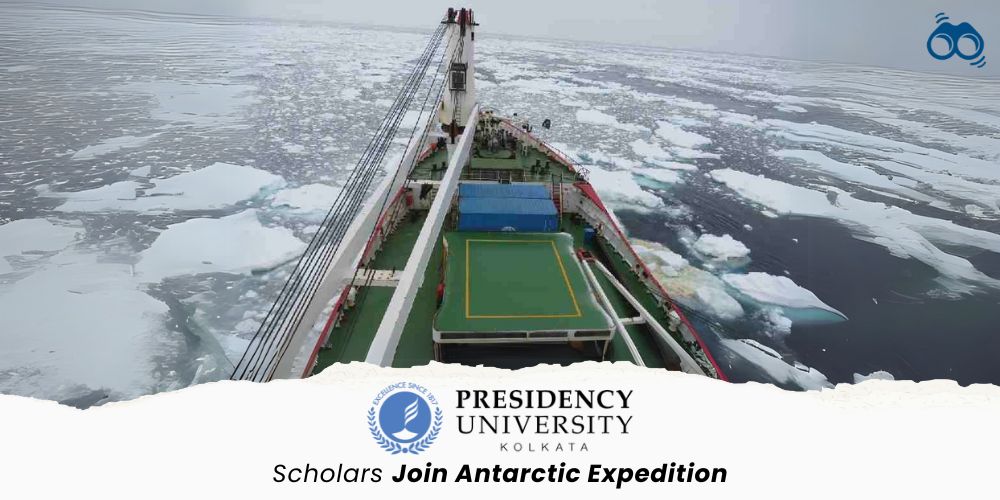Southern Ocean's Fragile Ecosystem Under Study by Indian Scientists
Presidency University Students Join Pivotal Antarctic Research Mission
The Southern Ocean, where the Pacific, Atlantic, and Indian Oceans converge, is crucial for global climate regulation and supports a fragile ecosystem. However, this region is severely impacted by climate change and the reduction of sea ice. The diminishing sea ice threatens marine species and disrupts the Antarctic food web, while altered ocean temperatures and currents lead to more extreme weather patterns. These changes compromise the ocean's ability to absorb carbon dioxide, thereby accelerating climate change. Scientific research and expeditions are vital to understanding these impacts and developing strategies to protect the Southern Ocean’s unique environment for future generations.
Recently, two talented research scholars, Snigdha Bhaumik and Soumya Subhra Baishnab from Presidency University in Kolkata, are preparing to embark on the 12th Indian Scientific Expedition to the Southern Ocean. This expedition is organized by the National Centre for Polar and Ocean Research (NCPOR) under the Ministry of Earth Sciences. The Southern Ocean’s role in global climate regulation, combined with its fragile ecosystems, makes the research conducted by Snigdha and Soumya particularly significant. Snigdha, the first female research scholar from Bengal to join the expedition, views this as more than an academic milestone. Her passion for marine ecology, rooted in a childhood fascination with wildlife through channels like NatGeo and Animal Planet, led her to pursue a career in this field.
She began her academic journey at Scottish Church College, where she completed her BSc. She credits her professor, Dr. Aniruddha Chatterjee, for fostering her passion. Her research will focus on macrobenthos, aquatic invertebrates larger than 500 microns. Snigdha plans to employ technologies such as DNA barcoding to study the impacts of climate change on marine ecosystems, while also exploring the evolutionary history of these organisms.
Soumya, hailing from Rasulpur in Bardhaman, faced numerous challenges throughout his academic journey. Despite initial scepticism about his career choices, he persevered in his PhD research and proved the validity of his decision. Soumya holds honours in zoology from Chandernagore Government College and a Master's degree from Burdwan University. His research will focus on meiobenthic organisms ranging from 63 to 500 microns.
Professor Sumit Mandal, a faculty member at Presidency University and mentor to both scholars, expressed immense pride in his students. Having participated in the 11th expedition in 2020, he understands the significance of their achievement. Professor Mandal shared that Snigdha and Soumya will focus on studying the impacts of climate change over the past five years, tracking evolutionary histories, and assessing the effects of glacier melting. He confirmed that both scholars had successfully passed all physical and mental tests and were well-prepared for the expedition. He expressed pride in their departure, emphasizing that it sets an example for others.
The administration of Presidency University, including Registrar Debojyoti Konar, Dean Arun Kumar Maiti, and Head of Life Sciences Professor Prabir Kumar Mukhopadhyay, also extended their full support and pride for the scholars. In 1983, Sudipta Sengupta, a professor of structural geology at Jadavpur University and a trained mountaineer, was selected for the Third Indian Expedition to Antarctica. Along with marine biologist Dr Aditi Pant, she became one of the first Indian women scientists to set foot on the continent. Their pioneering efforts paved the way for future expeditions. As the SA Agulhas sails through the Southern Ocean, Snigdha and Soumya carry the aspirations of an entire generation of budding scientists.
Editor's Note:
The 12th Indian Scientific Expedition to the Southern Ocean, featuring research scholars Snigdha Bhaumik and Soumya Subhra Baishnab from Presidency University, Kolkata, is a mission of critical importance. The Southern Ocean’s convergence of the Pacific, Atlantic, and Indian Oceans plays a pivotal role in global climate regulation, and its fragile ecosystem is increasingly threatened by climate change and sea ice reduction. The research on macrobenthic and meiobenthic organisms being conducted by Snigdha and Soumya is crucial for understanding the impacts of these changes and developing strategies for ecosystem protection. Despite facing personal and professional challenges, their dedication exemplifies the resilience of young Indian scientists. Their work promises to contribute valuable insights to the global scientific community and inspire future generations.
According to Skoobuzz, this mission goes beyond research; it serves as a call to action to address the urgent issue of climate change. The findings from this expedition could shape future policies and strategies, making the success of Snigdha and Soumya a success for all.














0 Comments (Please Login To Continue)